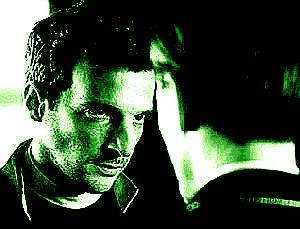Film Review

Gerstein's motivation for his actions are clearly presented in the film. A family man and Christian, he was genuinely disgusted by the way in which his scientific work was perverted towards an evil end. He had every reason to believe he could change things for the better, since the Church had already been very effective in stopping the Nazi's programme of enforced euthanasia against infirm and handicapped people. Surely if the Church spoke out against the wholesale slaughter of Jews German public opinion would compel the Nazi's to cease this unspeakable barbarity? Unfortunately, the Catholic Church had divided loyalties. Would such a condemnation not send a signal they had taken sides in the war, implying that they were on the side of Stalin, a figure who was widely seen as a greater threat than Hitler? Also, it is debatable how much influence the Church really did have over the Germany people. To what extent were the Germans willing participants in the extermination of the Jewish race - this is a question that remains unanswered to this day.
The inability of Gerstein to persuade the Pope to directly condemn the Nazi's treatment of Jews is the film's central theme, around which personal conflicts of interest are skilfully woven. The character Riccardo Fontana (played by the cult figure Mathieu Kassovitz, director of La Haine and of Jewish descent himself) is entirely a fictional character, an amalgam of several figures who were caught up in the futile struggle to out the truth of the Holocaust. The film is based loosely on the stage play "The Representative" by Rolf Hochhuth, which proved to be enormously controversial when it was first performed in the mid-1960s.
Costa-Gavras succeeds in portraying a tragic and poignant story with the minimum of sentiment and dramatic artifice and provides a worthy lesson in the morality of passive complicity. It is an open question as to what may have happened if the Catholic Church had dared to champion the cause of the Jews during the Second World War. Would the Holocaust have ceased or would the situation have worsened, with the Church having even less influence over German public opinion? Perhaps Costa-Gavras goes a tad too far in implying the Church was at fault without presenting an entirely fair and balanced view of the factors which prevented the Church from doing more to oppose the Holocaust. As the film's French poster implies (by showing a crucifix merged with a Nazi swastika) the suggestion is that the Pope was a willing partner with the Nazis - something which may generate publicity for the film but which is both obscenely offensive and historically inaccurate. The film would have been on far safer ground if it had focused more on the story of its principal protagonist, Kurt Gerstein. Unfortunately, very little is revealed about this interesting character, in spite of the fact that his detailed documentation of the Holocaust was a source used by the film's screenwriters. Another problem is that whilst Ulrich Tukur's performance is competent and, in places, very moving, it is too weak to carry the film.
Whilst Amen merits praise for its sensitive portrayal of the moral ambiguities of a troubled period in human history, its failure to totally engage the spectator (in the way that Roman Polanski's The Pianist does) makes it a disappointment. Costa-Gavras' decision to make the film in English appears to have been motivated more by commercial necessity than for artistic reasons, and was perhaps a bad choice given that few members of the cast are native English speakers. To his credit, the director avoids showing us scenes of the Jews being murdered and instead shows the concentration camps from the point of view of German officers. Not only does he avoid the familiar stock clichés of the Holocaust but he also manages to convey something of the impact of the horror on those that perpetrated it. Unfortunately, the cut-away sequence of a train carrying Jews to the concentration camps is overused and becomes less and less effective, even comical, towards the end.
Despite its obvious faults and its worryingly biased perspective, Amen is a film that deserves to be seen - not for its own merit, but for its educational value and for the complex themes it evokes. It may not have the force and depth of other contemporary films about the Holocaust, but it is still a compelling drama with an important central message: he who does not speak out against evil when he finds it will be judged to be complicit in that evil.
© James Travers 2004
The above content is owned by frenchfilms.org and must not be copied.
Film Synopsis
During the Second World War, Kurt Gerstein works for the Nazis on various disinfection and purification programmes. To his horror, he learns that a chemical he has developed for benevolent use is intended to be used to gas Jews in the concentration camps. Gerstein feels impelled to tell the world of this terrible discovery, but his efforts to warn the Catholic Church profile futile at first. Then he comes into contact with a young Jesuit priest, Riccard Fontana, who assists him in his attempts to inform the world about the Nazis' callous slaughter of entire Jewish families. Both men are certain that once the world community hears of this outrage the Nazis will immediately put an end to it. But things prove not to be that simple. Neither the Pope nor the American Ambassador appears capable of denouncing this monstrous crime. And as each day passes, more and more Jews are stripped and forced into the sealed rooms where they will be asphyxiated - men, women and children. Surely something can be done to stop this...?© James Travers
The above content is owned by frenchfilms.org and must not be copied.
Similar Films
Here are some other films you may enjoy watching:Other related links:
Film Credits
- Director: Costa-Gavras
- Script: Costa-Gavras, Jean-Claude Grumberg, Rolf Hochhuth (play)
- Cinematographer: Patrick Blossier
- Music: Armand Amar
- Cast: Ulrich Tukur (Kurt Gerstein), Mathieu Kassovitz (Riccardo Fontana), Ulrich Mühe (Doctor), Michel Duchaussoy (Cardinal), Ion Caramitru (Count Fontana), Marcel Iures (Pope), Friedrich von Thun (Gerstein's Father), Antje Schmidt (Mrs. Gerstein), Hanns Zischler (Grawitz), Sebastian Koch (Höss), Erich Hallhuber (Von Rutta), Burkhard Heyl (Director), Angus MacInnes (Tittman), Bernd Fischerauer (Bishop von Galen), Pierre Franckh (Pastor Wehr), Richard Durden (Ambassador Taylor), Monica Bleibtreu (Mrs. Hinze), Justus von Dohnányi (Baron Von Otter), Günther Maria Halmer (Pastor Dibelius), August Zirner (Von Weizsäcker)
- Country: France / Germany / Romania
- Language: English / French / Italian / German
- Support: Color
- Runtime: 132 min
The very best French thrillers

The best of American cinema

The Carry On films, from the heyday of British film comedy
